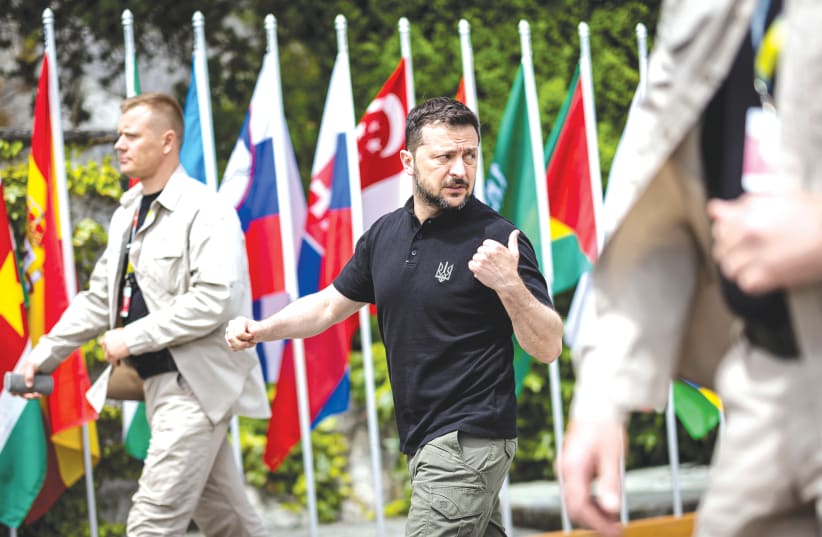As Western pressure mounts on nations like Israel and Armenia to recalibrate ties with Moscow amidst Ukraine tensions, geopolitical alliances are swiftly evolving.

Last February, the prominent American think tank Brookings Institute stated that “NATO allies must manifest their support for Ukraine through bilateral security arrangements.” Since the publication of that report, the United States and other Western countries have exerted pressure on several nations to be more supportive of the Ukraine.
It has become evident that this Western pressure on countries to abandon their ties with Moscow is beginning to bear fruit.
For example, Israel and Armenia’s relationships with Russia have become strained due to both countries’ increasingly strong ties with the West. Israel recently signed a communique related to Ukraine that declares: “All prisoners must be exchanged and all Ukrainian civilians who have been unlawfully displaced should be returned to Ukraine.”
Israel’s policy shift
Russia was absent from the Summit on Peace in the Ukraine, but Israel was present and voted with the West. This is a sign that Israel’s policy towards Russia has shifted since Operation Iron Swords began.
With Russia increasingly relying on Iranian drones to win its war in the Ukraine and Putin using antisemitic rhetoric in order to win over the hearts and minds of Chechens – so that they will help him win the Ukraine war – the Russian-Israeli relationship is worsening.
According to the Brookings Institute, Putin decided to abandon Israel out of fear: “On October 29, 2023, there was a shocking incident in the Russian regional capital of Dagestan, Makhachkala, when a group of several hundred young Muslim men rioted and invaded the airport in search of an Israeli plane and Jewish passengers arriving from Tel Aviv.
The scenes – reminiscent of those across the Arab world in reaction to the unfolding war in Gaza – rattled Moscow. Embracing Hamas and repudiating Israel is now tied to placating Russia’s own sizable Muslim population and heading off inter-ethnic and religious violence at home.”
Simultaneous to Putin abandoning Netanyahu during his hour of need, Operation Iron Swords has made Israel increasingly dependent upon the United States in order to maintain its security. After all, without America’s support at the UN Security Council and propping up the Jewish state militarily, Israel would face an even more uphill struggle in its war against Hamas, Hezbollah, the Houthis, and the Islamic Republic of Iran who stands behind them all.
Therefore, Israel must listen to the United States and support America in the Ukraine crisis. After all, Israel is an ally of NATO and thus must behave as such. With Putin getting closer to Hamas and Iran, it is hard for Israelis to defend neutrality on Ukraine anymore.
Armenia, too, has been moving further away from Moscow and closer to the West. Russian Deputy Foreign Minister Mikhail Galuzin recently said, “Since November 2023, there have been no meetings of foreign ministers. Despite our proposal to develop and conclude the next plan of inter-midway consultations, our partners have shown no interest.
Regrettably, the dynamics of defense contracts have notably decreased and military-technical cooperation has also slowed down. We attribute this decline to pressure from Western forces, urging Yerevan [capital of Armenia] to minimize ties with our country.”
Armenia has also been actively avoiding participation in Collective Security Treaty Organization (CSTO) meetings, even going as far as to announce the suspension of its activities with the organization. CSTO is a military alliance in Eurasia consisting of six post-Soviet states: Armenia, Belarus, Kazakhstan, Kyrgyzstan, Russia, and Tajikistan, formed in 2002. Armenian Prime Minister Nikol Pashinyan has announced that it may withdraw from the CSTO altogether, and that this year it won’t participate in funding CSTO activities. Both statements have been viewed unfavorably by Moscow.
Moscow’s reaction may force Armenia to remain in the CSTO, but the very fact that it is pulling away from the organization demonstrates that the country presently now favors a partnership with the West over Moscow. As a result, the country is distancing itself from Russia, even if it fears abandoning Russia altogether. This is further testimony of the results of Western pressure to side with Ukraine and to move away from Putin.
For Azerbaijan, Armenia moving away from Putin is a positive move, increasing the likelihood of peace between the two Caucuses countries. The Russians had a vested interest in keeping the conflict going so that Moscow would be able to exert influence throughout the Caucuses. However, after Azerbaijan reclaimed all of Karabakh and is now moving to make peace with Armenia, this new reality works to weaken Moscow’s influence in the Caucuses – and this is a positive thing for the West.
If the West cuts ties with Moscow, what’s happens next?
However, if the West wants to further encourage peace in the Caucuses, it must also exert pressure on the Armenians, to abandon Moscow and to desist from a relationship with Tehran. If Armenia is at peace with Azerbaijan, it will no longer need to rely upon Iran to meet its needs as a blockaded landlocked country.
Since Iran is also against peace in the Caucuses, the West can do a lot to promote peace in the region by encouraging the Armenians to abandon the mullahs in the same way that they abandoned Putin. In a region free of Putin and Tehran, peace between Azerbaijan and Armenia could enter the realm of the possible.
The writer is a prominent Middle East scholar and commentator.
